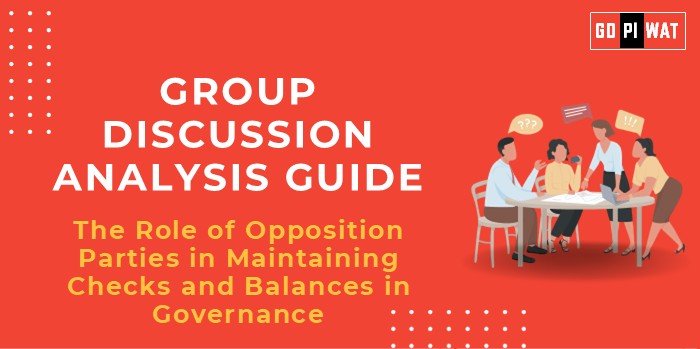📋 Group Discussion (GD) Analysis Guide: The Role of Opposition Parties in Maintaining Checks and Balances in Governance
🌐 Introduction
In a democracy, opposition parties serve as vital pillars to ensure transparency, accountability, and the prevention of executive overreach. From questioning legislative policies to exposing corruption, their role is pivotal in maintaining a functional democracy.
📊 Quick Facts & Key Statistics
- 📜 Constitutional Mandate: Article 75 of the Indian Constitution enforces collective responsibility, with the opposition acting as a parliamentary watchdog.
- 📋 Parliamentary Questions: Over 60% of questions in India’s 17th Lok Sabha were raised by opposition MPs, spotlighting governance issues.
- 🌍 Representation Gap: Globally, opposition parties represent over 45% of voters who did not vote for the ruling party.
- 🌐 Global Examples:
- 🇬🇧 United Kingdom: In 2021, opposition parties occupied 59% of seats in the House of Lords, playing a key role in legislative scrutiny.
- 🇺🇸 United States: Between 2019–2021, a divided Congress saw 30% of bills amended through opposition-led debates.
🤝 Stakeholders and Their Roles
- 🏛️ Opposition Parties: Act as policy critics, legal challengers, and reform advocates.
- ⚖️ Ruling Governments: Provide accountability under opposition scrutiny.
- 📢 Media: Amplifies opposition voices and reveals governance failures.
- ⚖️ Judiciary: Acts on opposition-led legal interventions to ensure justice.
📚 Achievements and Challenges
🏆 Achievements
- ✅ Legislative Oversight: Opposition raised over 60% of parliamentary questions in India’s 17th Lok Sabha.
- 📜 Policy Scrutiny: UK opposition scrutinized over 80 proposed bills in 2022, ensuring legislative transparency.
- ⚖️ Preventing Executive Overreach: South African opposition reversed 15 executive decisions (2010–2020).
- 🕵️ Corruption Watchdog: Brazil’s opposition exposed fraud in 45 government projects in 2021.
⚠️ Challenges
- 🧩 Lack of Unity: Fragmentation among opposition ranks weakens their impact.
- 📉 Electoral Systems: Often limit opposition representation despite significant voter support.
- 🔒 Authoritarian Constraints: Rising authoritarianism curtails opposition space in countries like Turkey and Hungary.
💡 Effective Discussion Approaches
📜 Opening Approaches
- 📊 Fact-Based Start: “60% of questions raised in India’s 17th Lok Sabha came from opposition MPs, underscoring their role in governance oversight.”
- 🌍 Global Reference: “Germany’s opposition controls 40% of Bundestag seats, actively contributing to policy oversight.”
🔄 Counter-Argument Handling
- ⚖️ Acknowledge: The risks of obstructionism while emphasizing the benefits of policy scrutiny.
- 🤝 Rebuttal: Highlight how bipartisan collaboration improves governance outcomes.
📊 Strategic Analysis of Strengths & Weaknesses
- 🌟 Strengths:
- Legislative oversight.
- Policy scrutiny.
- Corruption exposure.
- ⚠️ Weaknesses:
- Internal fragmentation.
- Limited representation in electoral systems.
- ✨ Opportunities:
- Leverage digital platforms for transparency.
- ⚡ Threats:
- Media bias.
- Reduced space in authoritarian regimes.
🗣️ Structured Arguments for Discussion
- 👍 Supporting Stance: “Opposition parties ensure governance accountability by exposing corruption and preventing executive overreach.”
- 👎 Opposing Stance: “Obstructionist behavior by opposition parties often delays critical policies and disrupts governance.”
- ⚖️ Balanced Perspective: “Opposition parties are essential for checks and balances, but they must focus on constructive criticism rather than mere opposition.”
🎓 Connecting with B-School Applications
- 📘 Real-World Applications:
- Leadership lessons from opposition dynamics.
- Ethical governance and crisis management in public systems.
- ❓ Sample Questions:
- “How does the opposition’s role vary across parliamentary and presidential systems?”
- “Can a fragmented opposition effectively maintain checks and balances?”
- 📖 Insights for Students:
- Analyze the impact of opposition in real-world governance for projects, internships, and leadership roles.


